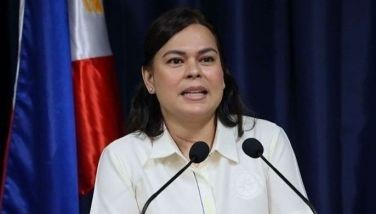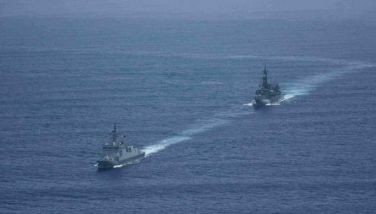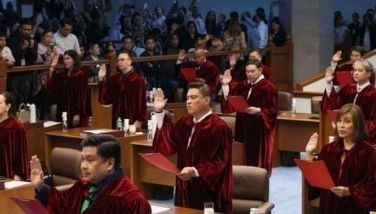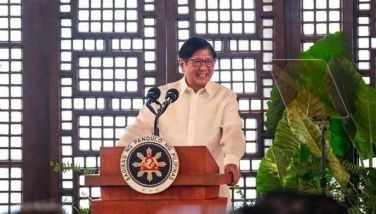FFCCII to hold convention in Manila
April 10, 2005 | 12:00am
Delegates from chambers of commerce all over the country are in Manila this weekend for the three-day convention of the economically powerful Federation of Filipino-Chinese Chambers of Commerce and Industry.
Representatives from almost 170 trade, financial and industry associations nationwide meet once every two years, and this is the Federation’s 25th convention in its 51-year history.
The highlight of this biennial exercise is the election, which starts this afternoon when the general membership chooses 186 members of the Council of Representatives, divided among 12 regions, the NCR and a regional executive council. The council will meet tomorrow to elect the 40-member board of directors, which will in turn choose the federation’s officers, including the president, executive vice president, and six vice presidents.
President Arroyo will induct the new officers in closing ceremonies at the Manila Hotel tomorrow.
The presidency of the federation is a highly coveted post, and elections often involve intense, sometimes bitter, behind-the-scenes maneuverings among interested parties and factions. The blessing of Malacañang has often been sought, and the Palace has, on several occasions in the past, been called upon to mediate between individuals and groups jockeying for the top post.
This year’s election is expected to be relatively free of controversy, as it is generally agreed that executive vice president Francis Chua will assume the presidency.
Two years ago though, Chua himself was the center of some controversy when he was elevated to the post of executive vice president, leapfrogging over five other more senior vice presidents. The move, which in turn elevated then EVP Robin Sy to the presidency in place of incumbent John K.C. Ng, was said to have had the full backing of Malacañang. Ng was then eligible for another two-year term, since he had merely served out the remainder of the term of Benjamin Chua, who died in 2002.
Ng, like other past presidents of the federation, was given the title of honorary president. He was also given the rank of ambassador. Other honorary presidents of the federation are Domingo Lee, Yao Eng Hue, Jimmy Tang and Vicente Yu. Robin Sy is now expected to join the distinguished list.
Taipan Lucio Tan, also a past president, holds the title of chairman emeritus.
Chua, a close supporter of President Arroyo, heads Mabuhay Satellite Corp., the company behind the Agila II satellite that provides video, IP and telecommunications services for clients in Asia and North America. Last year, during the state visit of Mrs. Arroyo to Beijing, Chua was among top Chinese-Filipino business leaders who pledged P1 million to the Pera Para sa Pilipinas fund, created by Speaker Jose de Venecia to alleviate the country’s "fiscal crisis."
The socially visible Chua, a graduate of the University of the Philippines, is expected to be a more progressive leader of an organization that is sometimes seen as a bastion of aging traditionalists.
Formed in 1954 to bring together the various trade, business, industrial and financial associations in the Filipino-Chinese community across the country, the federation was often regarded as a milking cow for political candidates, unscrupulous politicians and crooked law enforcers. The aversion of the community to publicity and active, open involvement in government and society fueled this practice.
The federation funded and engaged in civic projects like disaster relief, medical missions and construction of schoolhouses, the latter so far its most successful project. Its Operation Barrio School donated almost a thousand classrooms in the last two years.
But on more sensitive issues like peace and order, particularly kidnapping where the victims are mostly Chinese-Filipinos, the organization is perceived to be too passive, opting for the usual safe, low-profile stance.
While Chua’s proximity to Malacañang and a more articulate participation in mainstream society could mean a more pro-active role for the powerful federation, sources in the community say he will have to compromise and strike a balance with the conservative position of the traditionalists, whose numbers in positions of power in the organization are still significant.
Seen as crucial in this year’s election is the executive vice presidency, a position for which there is intense competition. Intense too is competition for the slot in the vice presidency which will be vacant should one of them move up to the EVP post. Currently, the vice presidents are Robert Siy Chin, John K. Tan, Vicente Sitosta, Tan Tian Siong, Jesse Sy and Henry Ah.
With the Philippine economy in great need of dynamic and active participation from all concerned sectors, the federation, with its considerable economic clout and widespread membership, can make a crucial and significant contribution, the extent and scope of which will be determined by its leadership in the next two years.
Representatives from almost 170 trade, financial and industry associations nationwide meet once every two years, and this is the Federation’s 25th convention in its 51-year history.
The highlight of this biennial exercise is the election, which starts this afternoon when the general membership chooses 186 members of the Council of Representatives, divided among 12 regions, the NCR and a regional executive council. The council will meet tomorrow to elect the 40-member board of directors, which will in turn choose the federation’s officers, including the president, executive vice president, and six vice presidents.
President Arroyo will induct the new officers in closing ceremonies at the Manila Hotel tomorrow.
The presidency of the federation is a highly coveted post, and elections often involve intense, sometimes bitter, behind-the-scenes maneuverings among interested parties and factions. The blessing of Malacañang has often been sought, and the Palace has, on several occasions in the past, been called upon to mediate between individuals and groups jockeying for the top post.
This year’s election is expected to be relatively free of controversy, as it is generally agreed that executive vice president Francis Chua will assume the presidency.
Two years ago though, Chua himself was the center of some controversy when he was elevated to the post of executive vice president, leapfrogging over five other more senior vice presidents. The move, which in turn elevated then EVP Robin Sy to the presidency in place of incumbent John K.C. Ng, was said to have had the full backing of Malacañang. Ng was then eligible for another two-year term, since he had merely served out the remainder of the term of Benjamin Chua, who died in 2002.
Ng, like other past presidents of the federation, was given the title of honorary president. He was also given the rank of ambassador. Other honorary presidents of the federation are Domingo Lee, Yao Eng Hue, Jimmy Tang and Vicente Yu. Robin Sy is now expected to join the distinguished list.
Taipan Lucio Tan, also a past president, holds the title of chairman emeritus.
Chua, a close supporter of President Arroyo, heads Mabuhay Satellite Corp., the company behind the Agila II satellite that provides video, IP and telecommunications services for clients in Asia and North America. Last year, during the state visit of Mrs. Arroyo to Beijing, Chua was among top Chinese-Filipino business leaders who pledged P1 million to the Pera Para sa Pilipinas fund, created by Speaker Jose de Venecia to alleviate the country’s "fiscal crisis."
The socially visible Chua, a graduate of the University of the Philippines, is expected to be a more progressive leader of an organization that is sometimes seen as a bastion of aging traditionalists.
Formed in 1954 to bring together the various trade, business, industrial and financial associations in the Filipino-Chinese community across the country, the federation was often regarded as a milking cow for political candidates, unscrupulous politicians and crooked law enforcers. The aversion of the community to publicity and active, open involvement in government and society fueled this practice.
The federation funded and engaged in civic projects like disaster relief, medical missions and construction of schoolhouses, the latter so far its most successful project. Its Operation Barrio School donated almost a thousand classrooms in the last two years.
But on more sensitive issues like peace and order, particularly kidnapping where the victims are mostly Chinese-Filipinos, the organization is perceived to be too passive, opting for the usual safe, low-profile stance.
While Chua’s proximity to Malacañang and a more articulate participation in mainstream society could mean a more pro-active role for the powerful federation, sources in the community say he will have to compromise and strike a balance with the conservative position of the traditionalists, whose numbers in positions of power in the organization are still significant.
Seen as crucial in this year’s election is the executive vice presidency, a position for which there is intense competition. Intense too is competition for the slot in the vice presidency which will be vacant should one of them move up to the EVP post. Currently, the vice presidents are Robert Siy Chin, John K. Tan, Vicente Sitosta, Tan Tian Siong, Jesse Sy and Henry Ah.
With the Philippine economy in great need of dynamic and active participation from all concerned sectors, the federation, with its considerable economic clout and widespread membership, can make a crucial and significant contribution, the extent and scope of which will be determined by its leadership in the next two years.
BrandSpace Articles
<
>
- Latest
- Trending
Trending
Latest
Trending
Latest
Recommended





























